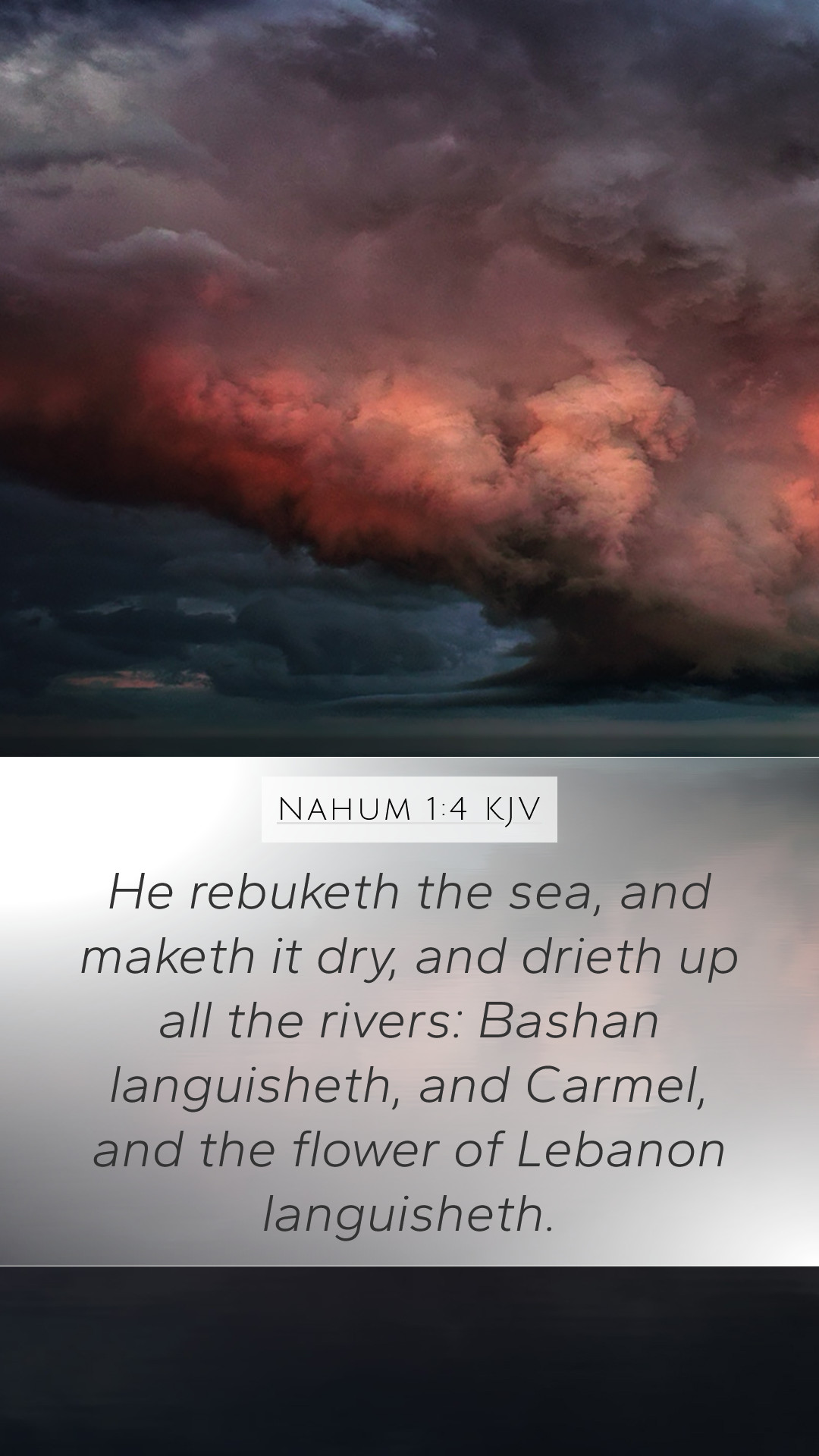Old Testament
Genesis Exodus Leviticus Numbers Deuteronomy Joshua Judges Ruth 1 Samuel 2 Samuel 1 Kings 2 Kings 1 Chronicles 2 Chronicles Ezra Nehemiah Esther Job Psalms Proverbs Ecclesiastes Song of Solomon Isaiah Jeremiah Lamentations Ezekiel Daniel Hosea Joel Amos Obadiah Jonah Micah Nahum Habakkuk Zephaniah Haggai Zechariah MalachiNahum 1:4 Meaning
What is the meaning of Nahum 1:4?
He rebuketh the sea, and maketh it dry, and drieth up all the rivers: Bashan languisheth, and Carmel, and the flower of Lebanon languisheth.
Nahum 1:4 Bible Verse Meaning
Understanding Nahum 1:4
Bible Verse: Nahum 1:4 - "He rebuketh the sea, and maketh it dry, and dryeth up all the rivers: Bashan languisheth, and Carmel, and the flower of Lebanon languisheth."
Nahum 1:4 serves as a powerful proclamation of God's sovereignty over nature and the elements. This verse emphasizes His authority as a divine arbiter, showcasing His ability to control even the most tumultuous forces in creation.
Bible Verse Meanings
The verse illuminates God's power through vivid imagery of natural phenomena. By rebuking the sea and drying rivers, it denotes His capability to command nature itself, which is essential for understanding scripture’s portrayal of His majesty and dominion over the world.
Bible Verse Interpretations
- Control Over Nature: The act of making the sea dry symbolizes God's control and governance over chaotic elements. Matthew Henry notes that this refers to His ability to bring order from chaos.
- Divine Judgment: This verse is often interpreted as a strong warning to nations, particularly Nineveh. Albert Barnes asserts that the drying up of rivers signals impending judgment and the loss of sustenance.
- Symbolic of Desolation: Adam Clarke emphasizes the imagery of languishing fertile lands, indicating a state of desolation that can come upon nations through divine intervention.
Bible Verse Understanding
Understanding Nahum 1:4 involves recognizing the historical and theological context. The reference to Bashan and Carmel suggests destruction of formerly prosperous lands, indicative of the consequences of sin and rebellion against God.
Bible Verse Explanations
In a deeper biblical exegesis, this passage illustrates a direct correlation between God's anger and the state of creation, as nature itself responds to divine rebuke. Through this lens, believers can grasp the significance of divine power and the relationship between God’s sovereignty and the natural world.
Scripture Analysis
By analyzing Nahum 1:4, we uncover essential Bible study insights focusing on God's justice. This verse serves as both a warning and a testament to God’s unwavering agency in the world, calling for reflection among Israel and the nations.
Cross References
- Psalm 46:6: “The nations are in uproar, the kingdoms totter; He utters His voice, the earth melts.”
- Isaiah 50:2: “Where is your mother's certificate of divorce, with which I sent her away? Or which of my creditors is it to whom I have sold you? Behold, for your iniquities you were sold, and for your transgressions your mother was sent away.”
- Micah 1:4: “And the mountains will melt under Him, and the valleys will split open, like wax before the fire, like waters poured down a steep place.”
Application of Nahum 1:4
This verse invites readers to apply its insights to daily life. It encourages reflection on God’s omnipotence and the need for humanity to live in accordance with divine will to avoid judgment. This same principle can be a topic explored in Bible study groups and online Bible study sessions.
Conclusion
In summary, Nahum 1:4 is a profound reminder of God's sovereign power over creation. It underscores the significance of understanding Scripture within a broader historical and theological context, emphasizing the necessity for personal and communal reflection in one's spiritual journey.


